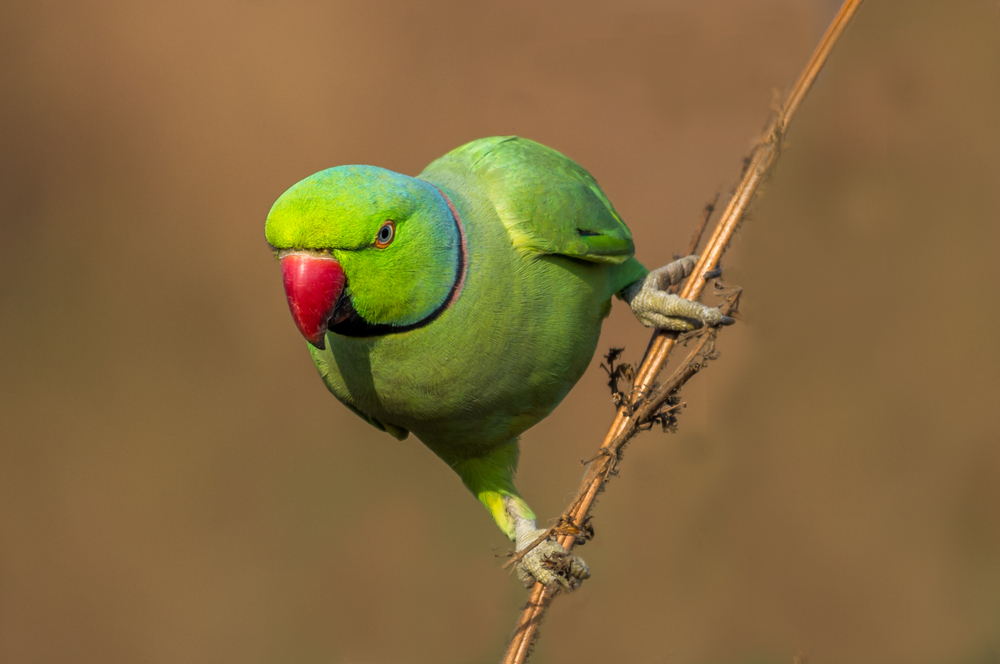
Ring-necked parakeets from southern Asia and sub-Saharan Africa have taken up roost in parks and gardens all around Europe, and are becoming so numerous and bold, that they’re likely to be regarded with little more curiosity by future generations than the common pigeon, according to Hazel Jackson, an evolutionary biologist and wildlife conservationist based at the Durrell Institute of Conservation and Ecology (DICE) at the University of Kent.
‘Parakeets are Britain’s fastest growing bird population and are on a trajectory to global domination,’ says Jackson, writing in The Conversation. ‘Breeding populations are now established in at least 65 cities around Europe, and more than 30 countries across five continents.’
While park dwellers may delight in the spectacular splashes of colour these vibrant visitors bring to the green areas of the continent’s concrete jungle, there is a potentially negative side to their presence. ‘Non-native, or ‘invasive’ species are one of the biggest causes of biodiversity loss in the world today, and can cause severe economic damage,’ cautions Jackson.
The parakeet population explosion is believed to have begun in the 1960s, with its epicentre in London. Exactly what (or who) started it all isn’t entirely understood, but there are several theories out there, some of which are as colourful as the birds themselves. One rumour maintains that a posse of parakeets escaped from the film set of the African Queen, and another claims that Jimi Hendrix released a batch of the birds to add a dash of psychedelic colour to the drab streets of London.

A more mundane (and probable) explanation is that the various populations of parakeets stem from people keeping the birds as pets, and then losing them. Jackson reports that 146,539 ring-necked parakeets were imported to Europe between 1984 and 2007, with 16,000 of them coming to the UK, before the EU introduced a ban on the trade of wild birds.
Parakeets naturally range right across two continents, but the species most commonly observed across Britain and Europe originate predominately from Pakistan and the chillier foothills of the Himalaya, presumably because they’re more accustomed to the weather conditions they encounter in their adopted home.
However, while the exotic species is now flourishing in the fields, gardens and parks of Britain, an earlier invasion of parakeets into the UK, which was reported in the 1800s, completely failed, with the birds unable to survive the cold winters. The success of the ring-necked roamers this time around is, therefore, believed to be another brightly flashing indicator of climate change affecting wildlife.
The real impact this influx of iridescent interlopers will have on European and British birds, and local biodiversity, remains unknown, however. It’s probable they will compete for food and nesting space with natives such as nuthatches, they’re likely to bully others off bird feeders in people’s gardens, and they could yet prove to be a pest for farmers, as they are in Asia and Africa.
And, while native falcons such as peregrines and sparrow hawks have been dining out on their newfound exotic delights, it’s pretty clear that the population of parakeets is likely to continue to thrive and grow, leading Jackson to conclude: ‘I suspect our children and their children may simply consider them no more exciting than a common pigeon’.
[geoip-content not_country=”CA”]
ON THE APP
 City Slickers
City Slickers
Parakeets aren’t the only streetwise birds to have adapted to modern urban life—penguins are at it too: They’ve got their tuxedos on and are ready to hit the town in style! Follow South Africa’s penguins as they waddle their way from sunny beaches to chic resort hotels, private pools, golf courses and even into people’s homes.
Want to watch City Slickers for free right now? Subscribe to the Love Nature streaming app and start your 30-day free trial of the best on-demand natural history documentaries out there. [/geoip-content]

